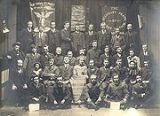
tradition. It is best known for its advocacy of using the ballot box for revolutionary purposes; opposition to reformism; and its early adoption of the theory of state capitalism
to describe the Soviet Union
. Detractors have been known to mockingly refer to it as Simon Pure's Genuine Brand or the Small Party of Good Boys.
The Socialist Party of Great Britain was founded in 1904 as a split from the Social Democratic Federation
(SDF).
The Russian debacle is rather appalling but quite explicable. Lenin and Trotsky appear to me to be of the SPGB type or the wilder types of the SDP.![]()
The Socialist Party of Great Britain… denounced the Russian Revolution as state-capitalist within hours of hearing of it.![]()
Actually, I was a member of something called the Socialist Party of Great Britain at school for a while. You had to pass an exam, you know. You could not just join.![]()
In 1905 another split took place in the SDF, when part of the membership this time mainly centred in London formed the Socialist Party of Great Britain, a body so sectarian that it adjured both politics and trade union action, believing that socialism would come when everyone was converted. Fifty years later it was still a tiny sect, mainly concerned with echoing propaganda hostile to the Soviet Union.![]()

